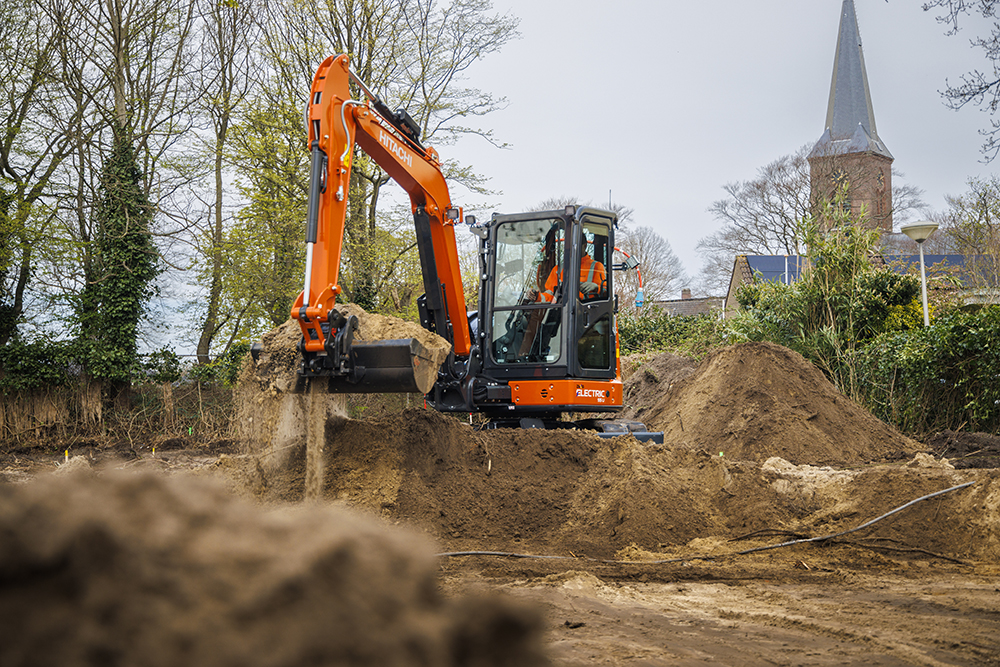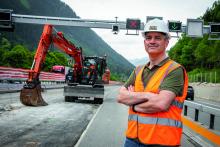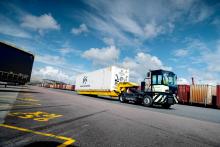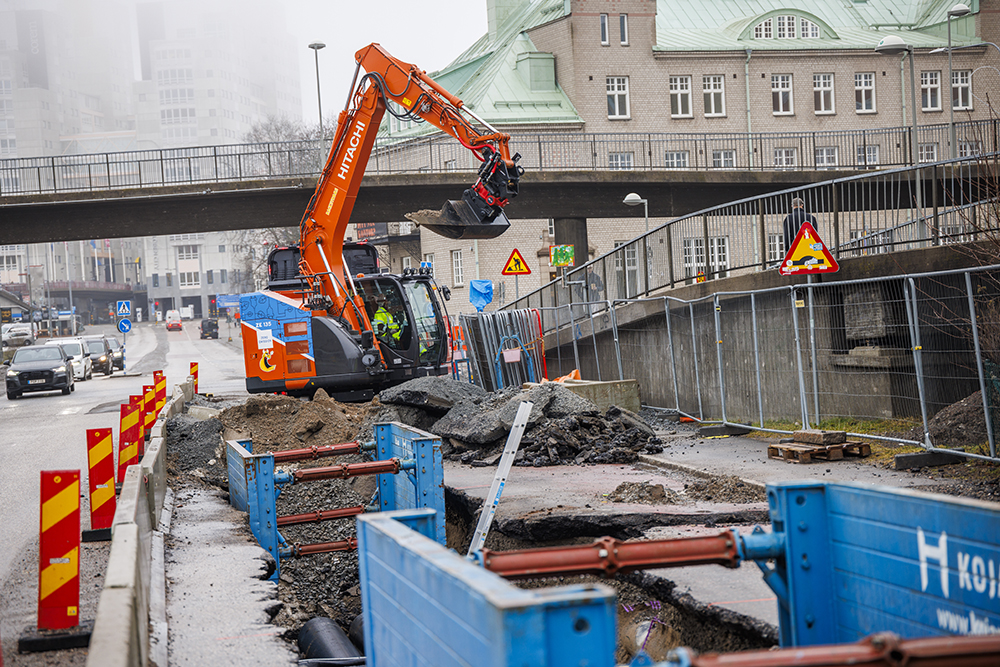
One of the projects is focused on the Meatpacking District, which will be developed into an enticing destination combining residential and commercial properties, as well as food, culture and other venues by 2033. The infrastructure required involves moving the existing heating and cooling pipework. Stockholm has the world’s largest district cooling system, which is 250km long and continuing to expand.
The ZE135 (developed by KTEG, a joint venture between Hitachi Construction Machinery (HCM) – and German dealer Kiesel) was used by contractor Bäckströms, working on a project for energy provider Stockholm Exergi. It helped to install a 500m stretch of cooling pipes in February and March 2024. The electric excavator was selected to excavate the trenches, lay the two-way pipes and backfill ready for the completion of the contract.
Getting closer to zero emissions
The introduction of the ZE135 and its battery charging unit have been a success according to Stockholm Exergi Construction Manager Johan Schröder: “We’re aiming to get as close to zero primary energy use as possible and therefore the selection of the supplier and equipment for projects such as this are a top priority.
“Bäckströms is the only one of our contractors that has used an electric excavator on one of our job sites. It’s obviously quieter than conventional machines, we’re happy with the zero emissions and there’s even a good place here for the charging unit that is required to go with it.”
It’s no surprise that Bäckströms accepted an invitation from Hitachi Construction Machinery (Europe) (HCME) and its authorised dealer in Sweden, Delvator, to try out the ZE135, and the smaller HCM-developed ZX85-6EB and ZX55U-6EB electric excavators. The company’s slogan, “We’re building a better Stockholm”, is typical of the environmentally friendly approach adopted by its business at large, which includes the supply of construction machinery and materials, as well as the removal of materials, recycling and transportation.
“We were incredibly happy and grateful when we were asked by Delvator if we were interested in testing the Hitachi electric machines,” says Bäckströms CEO Jerry Magnusson. “There are three main reasons why we agreed to cooperate so quickly.
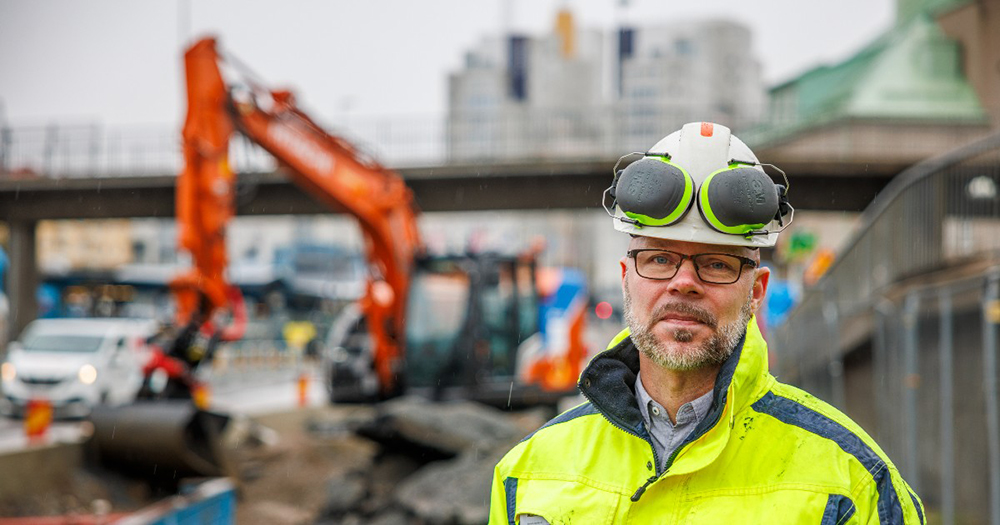
“Firstly, the City of Stockholm will implement a low emission zone in part of the city centre – where many of our machines work – at the end of this year. An expansion of this area is also being investigated in 2024 and decided in the first half of 2025.
“The second reason is that we aim to stay ahead of our customers' requirements and satisfy them before they ask for a different solution. And finally, our group has set sustainable goals and indicated how these will be met – and the test is an important part of this programme.”
Jerry and his team have been impressed with Delvator and HCME throughout the project. In addition, they have received “excellent support” and met with Hitachi representatives from Europe and Japan. As Jerry concludes, “We are starting to feel confident that the overall operation could work for us in terms of future collaboration.
“We have always liked Hitachi as a brand. Now that we’ve seen how determined Hitachi has been to make things happen – with support that works from a dealer we know and feel we can work with – it is starting to tick all the boxes!”
Portable power supply
The power for the machines was supplied by a 422kWh energy storage system and charging units developed by Alfen NV, in collaboration with Itochu Corporation and HCM. Having signed a memorandum in October 2023, HCM is working with its two partners to achieve zero emissions on European construction sites.
The energy storage system and charging units are vital pieces of supporting equipment for the electric excavators. They are compact, easily transportable and convenient for an urban job site such as the Meatpacking District.
Bäckströms Project Support Anton Silvennoinen explains how this works in practice: “The ZE135 is used for about 3.5 hours each morning, and when the operator goes for lunch, we take the opportunity to use the faster DC cable and recharge the machine’s battery in about 45 minutes.

“The work will continue until the end of the day, then we leave the machine connected to the slower AC cable overnight. It keeps the battery warm for optimum performance – and it’s ready for work the next morning.
“As the charging unit allows us to safely connect to the Hitachi electric excavators on site, we don’t have to move the machines very far – and so this is the perfect scenario. In addition, we are not dependent on a single connection point and are flexible to work all over Stockholm.”
Anton has also worked closely with the ZE135 and the other two smaller machines and says: “The advantage of electric equipment is that it is quiet, which is greatly appreciated by those working in close proximity and our customers like the fact that it is an emission-free machine. Overall, I like the three electric excavators: they look good, the hydraulic system is fantastic and the operators are happy, which is always important.”
Give electric power a try!
Sebastian Molin has been an operator for five years, with previous experience of Hitachi Zaxis medium excavators, and was given the opportunity to test the ZE135 on the project. “My feeling after driving the ZE135 for some time now is that it is comfortable and I love the hydraulics,” he says. “It's also strong, productive, and fun to try something new.
“There is not much difference between a conventional diesel machine and this electric excavator. It's easy to disconnect the cables each morning, and you're ready to get to work right away. The biggest advantage of the ZE135 is the lack of noise. It’s much easier for me to communicate with my colleague when he is directing me, as we can hear each other so much better.
“At first, I was sceptical about testing the ZE135. However, now that I'm familiar with it, I think it's a good machine – and I would certainly recommend other operators to give electric power a try as well.”
Click here to find out more.
Content produced in association with Hitachi

